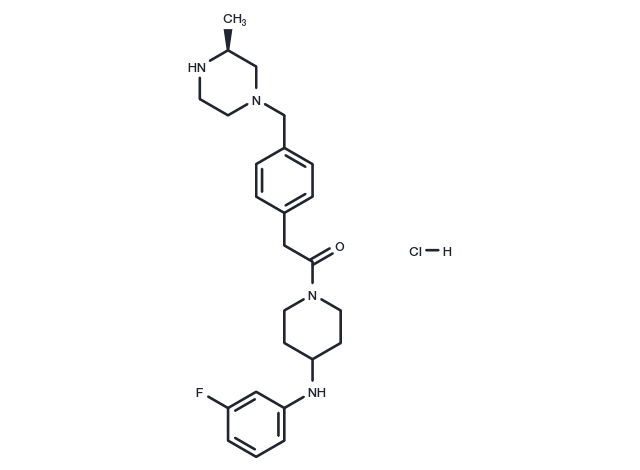Powder: -20°C for 3 years | In solvent: -80°C for 1 year


Camicinal hydrochloride (GSK962040 hydrochloride) is a selective agonist of motilin receptor (pEC50 = 7.9).

| Pack Size | Availability | Price/USD | Quantity |
|---|---|---|---|
| 1 mg | In stock | $ 163.00 | |
| 5 mg | In stock | $ 347.00 | |
| 10 mg | In stock | $ 497.00 | |
| 25 mg | In stock | $ 793.00 | |
| 50 mg | In stock | $ 1,130.00 | |
| 100 mg | In stock | $ 1,520.00 | |
| 500 mg | In stock | $ 2,970.00 | |
| 1 mL * 10 mM (in DMSO) | In stock | $ 388.00 |

| Description | Camicinal hydrochloride (GSK962040 hydrochloride) is a selective agonist of motilin receptor (pEC50 = 7.9). |
| Targets&IC50 | Motilin receptor:7.9 (pEC50) |
| In vitro | Camicinal hydrochloride activated the dog motilin receptor (pEC50 5.79; intrinsic activity 0.72, compared with [Nle13]-motilin) [1]. Camicinal hydrochloride was preferred because its initial IC50 values at CYP3A4 were significantly higher than our preferred threshold of 10 μM [2]. Camicinal hydrochloride had no significant activity at a range of other receptors (including ghrelin), ion channels, and enzymes. In rabbit gastric antrum, Camicinal hydrochloride (300 nmol/L -10 μmol/L) caused prolonged facilitation of the amplitude of cholinergically mediated contractions, to a maximum of 248 ± 47% at 3 μmol/L. The pEC50 values for motilin, erythromycin and Camicinal hydrochloride were, respectively, 10.4 ± 0.01 (n = 770), 7.3 ± 0.29 (n = 4) and 7.9 ± 0.09 (n = 17) [4]. |
| In vivo | Camicinal hydrochloride induced phasic contractions, the duration of which was dose-related (48 and 173 min for 3 and 6 mg/kg), driven by mean plasma concentrations >1.14 μmol/L. After the effects of Camicinal hydrochloride faded, migrating motor complex (MMC) activity returned. Migrating motor complex restoration was unaffected by 3 mg/kg Camicinal hydrochloride but at 6 mg/kg, MMCs returned 253 min after dosing, compared with 101 min after saline (n = 5 each) [1]. The oral bioavailability (Fpo) of Camicinal hydrochloride was found to be 48 (13%. Camicinal hydrochloride shows a long-lasting effect (T1/2) 46.9 (5.0 min at 3 μM) when compared with the short-lived effect of [Nle13]motilin (T1/2 ) 11.4 (1.5 min at 0.3 μM) [2]. Camicinal hydrochloride (5 mg/kg) also produced an increase in total faecal weight over the 2-h postdose period (21.2 ± 4.5 g; P < 0.05) [4]. Camicinal hydrochloride strongly facilitated cholinergic activity in the antrum, with lower activity in the fundus and small intestine only [4]. |
| Synonyms | GSK962040 hydrochloride |
| Molecular Weight | 461.02 |
| Formula | C25H34ClFN4O |
| CAS No. | 923565-22-4 |
Powder: -20°C for 3 years | In solvent: -80°C for 1 year
DMSO: 95 mg/mL (206.06 mM), Sonication is recommended.
H2O: 95 mg/mL (206.06 mM), Sonication is recommended.
You can also refer to dose conversion for different animals. More
bottom
Please see Inhibitor Handling Instructions for more frequently ask questions. Topics include: how to prepare stock solutions, how to store products, and cautions on cell-based assays & animal experiments, etc.
Camicinal hydrochloride 923565-22-4 GPCR/G Protein Others Motilin Receptor GSK962040 Hydrochloride GSK962040 Inhibitor GSK-962040 Hydrochloride GSK 962040 GSK962040 hydrochloride Camicinal MLNR Camicinal Hydrochloride GSK-962040 inhibit GSK 962040 Hydrochloride inhibitor
